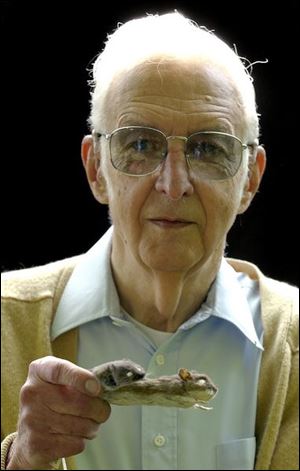
This Pied Piper's tune is fatal to rats
7/10/2004
William Jackson, who specializes in getting rid of live rodents, holds a couple of stuffed ones.
BOWLING GREEN - For a man responsible for countless deaths, William B. Jackson comes across as remarkably carefree.
He sits comfortably in his living room and speaks openly of his methods.
Of course, every one of his victims was a dirty rat.
Dubbed the "rat czar" by Bostonians and the "ultimate rat terminator" by Time magazine, Mr. Jackson has made a career out of studying rodents and other pests and finding better ways to get rid of them.
For years the retired professor of biological sciences at Bowling Green State University has traveled the world - from Massachusetts to the Marshall Islands - playing the role of the Pied Piper.
Mr. Jackson, 77, turned up in the news again earlier this week after a Missouri man claimed to have found a mouse in a bottle of Miller Lite beer and Mr. Jackson was called on for analysis.
Sitting in his Bowling Green home yesterday, Mr. Jackson declined to speak about the ongoing case but said he often gets involved as a consultant for various companies and industries regarding pest control.
"We don't want our environment contaminated by rodents or insects," he said.
Since 1957, he's been in Bowling Green examining pests and
their relationship to their environment.
Nothing - from their food habits to their reproductive patterns - escapes his notice as he searches for ways to deal with the pests that don't involve blindly slinging poison around.
For those times when poison is deemed the best solution, he's studied how to use it in ways that are unlikely to harm anything but his target.
And he is credited with being the first to confirm the presence in the United States of a so-called "super rat," rodents that developed a genetic resistance to conventional poisons.
There's little question that he's the expert, according to his colleagues.
"While I was there, he was the United Nations' expert on rodent control. Obviously you don't do something like that unless you're the tops in your field," said Harold Cones, one of the professor's former doctoral students, who now heads the biology, chemistry, and environmental science department at Christopher Newport University in Virginia.
Where rats are legion, so are Mr. Jackson's efforts.
Fifteen years ago, before Boston embarked on a massive project called the "Big Dig" to rebuild a highway that runs through the heart of downtown, the city called on Mr. Jackson to make sure the work didn't unleash thousands of rats upon the city from sewers and other subterranean homes.
Mr. Jackson also was involved in discussions about how to design the Chunnel, the tunnel used to whisk passengers and freight beneath the English Channel between France and Great Britain.
"They didn't want any French rodents in London," he said.
And after U.S. nuclear tests on Eniwetok Atoll in the Marshall Islands were completed, Mr. Jackson was asked to come in and study the lone survivors - rats.
Turns out the critters were able to burrow under the massive concrete structures that were designed to protect scientific instruments, shielding them from the blast and its harmful side effects, he said.
Even though he views them as an enemy to defeat, Mr. Jackson maintains a healthy respect for rats.
"I think they're fascinating. They're highly adaptable animals," he said.
Mr. Jackson, who has a doctorate in public health from Johns Hopkins University, retired from BGSU in 1985 and once had a consulting company near Hillsdale, Mich.
These days he does some consulting on his own.
His contributions to the field will be long remembered, according to Bobby Corrigan, who has worked with Mr. Jackson and who has a private company, RMC Pest Management Consulting, in Indiana.
"He was part of a group that had much more vision than many. He looks at the big picture in the classic sense - how one thing affects another," he said.
It is with this vision that Mr. Jackson looks toward Baghdad today and sees more than just the issue of how the political situation there will shake out. He sees rats.
Sitting back in his chair, he observes: "There obviously are going to be a lot of rodent problems once the political ones are cleaned up."
Contact Ryan E. Smith at:
ryansmith@theblade.com
or 419-724-6074.